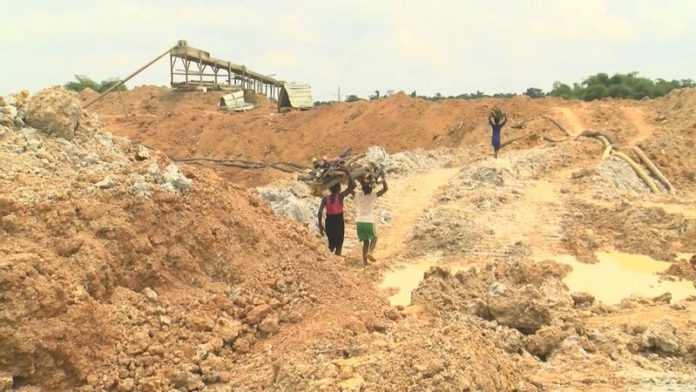The destruction of Ghana’s forests and rivers, exacerbated by corruption and local complicity, has left the nation vulnerable to severe environmental damage.
Illegal mining activities, commonly known as galamsey, are largely responsible for this devastation. These activities are often supported by local chiefs and facilitated by corrupt government officials, creating a cycle of destruction that is not only degrading the environment but also threatening the future of the country.
The involvement of corrupt politicians in enabling these criminals is deeply troubling, and the way it worsens the effects of climate change is heartbreaking.
Galamsey refers to illegal small-scale gold mining operations, primarily in Ghana.
These activities are typically unregulated and employ crude, rudimentary methods for extracting gold.
Such methods include alluvial mining, open-pit mining, underground mining, amalgamation, and others. Unfortunately, these unregulated mining operations cause severe environmental damage.
The harmful effects of galamsey on the environment are extensive. The excavation processes disrupt soil structures, leading to erosion and the loss of fertile topsoil. Without vegetation to stabilize the soil, erosion worsens, further degrading the land.
Toxic chemicals like mercury and cyanide, used in gold extraction, contaminate water bodies, affecting aquatic life and ecosystems while posing serious health risks to nearby communities that rely on these water sources. Contaminated rivers and lakes also emit methane, a potent greenhouse gas that accelerates climate change.
Deforestation is another grave consequence of galamsey, as forested areas are cleared to make way for mining activities.
This reduces the number of trees that can absorb carbon dioxide, thereby increasing the concentration of greenhouse gases in the atmosphere. The loss of biodiversity, which occurs when habitats are destroyed, reduces ecosystems’ resilience to adapt to climate change.
Moreover, deforested areas are more susceptible to flooding and landslides, especially when extreme weather events occur, which are becoming more frequent due to climate change.
The destruction of forests also releases the carbon stored in trees, further increasing carbon emissions. The degradation of ecosystems diminishes their ability to act as carbon sinks, reducing the earth’s natural capacity to absorb greenhouse gases.
The destruction of habitats caused by galamsey forces wildlife to either migrate or perish, weakening ecosystems and making them less capable of mitigating the effects of climate change.
Healthy ecosystems play a critical role in regulating the climate by maintaining a balance of gases in the atmosphere. Galamsey disrupts this balance, creating feedback loops that accelerate the pace of climate change. For instance, the loss of forest cover can result in higher local temperatures, leading to more frequent droughts and wildfires.
Additionally, pollution and land degradation caused by galamsey reduce agricultural productivity, leading to food insecurity and placing greater pressure on the remaining arable land.
This often leads to further deforestation, compounding the environmental crisis. Communities affected by environmental degradation are sometimes forced to migrate to urban areas, increasing the carbon footprint as these areas become more densely populated and resource-intensive.
Are we going to sit and watch our lands be destroyed, leading us to an environmental crisis? No, we must not stand by while our lands are ravaged. The time to act is now. Protecting the environment is not just about preserving nature; it’s about ensuring a healthy and sustainable future for all.
Collective action at the community, national, and global levels is essential to safeguard our lands and lives.
Addressing the destructive practices of galamsey is crucial in protecting the environment and combating climate change. Failure to act will have devastating consequences for our land, our people, and future generations. The cost of inaction is simply too high.
The writer, Carolyn Tetteh, is a social media executive at Adom FM.


